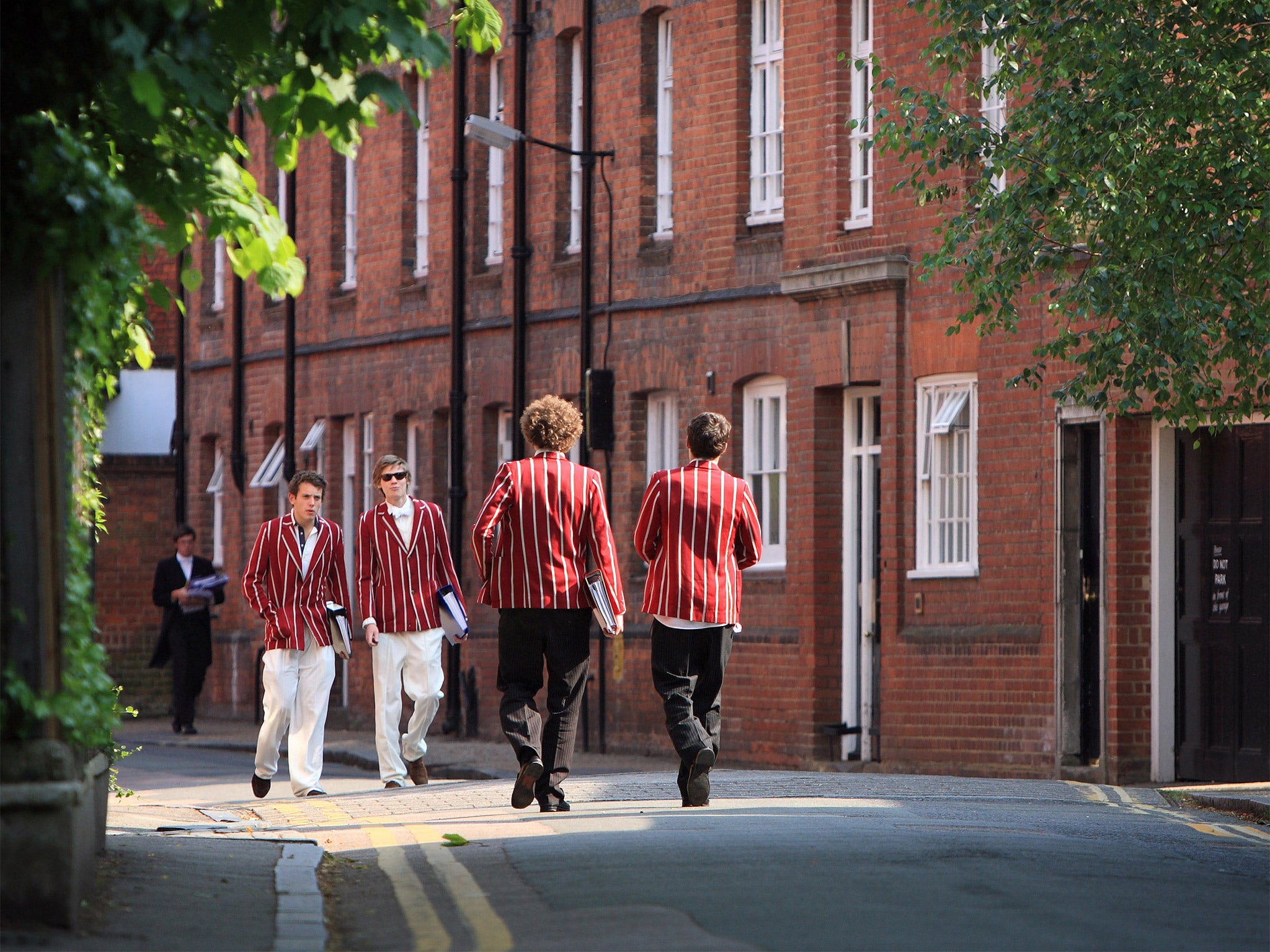Old boy's club still dominates public life, according to major new report

Your support helps us to tell the story
From reproductive rights to climate change to Big Tech, The Independent is on the ground when the story is developing. Whether it's investigating the financials of Elon Musk's pro-Trump PAC or producing our latest documentary, 'The A Word', which shines a light on the American women fighting for reproductive rights, we know how important it is to parse out the facts from the messaging.
At such a critical moment in US history, we need reporters on the ground. Your donation allows us to keep sending journalists to speak to both sides of the story.
The Independent is trusted by Americans across the entire political spectrum. And unlike many other quality news outlets, we choose not to lock Americans out of our reporting and analysis with paywalls. We believe quality journalism should be available to everyone, paid for by those who can afford it.
Your support makes all the difference.A “cosy club” of people educated at private schools and Oxbridge still dominates politics, the judiciary and media, and locks out talented people from more modest backgrounds, according to Government advisers.
In a hard-hitting report published today, the Social Mobility and Child Poverty Commission called for class to be given as much priority as gender and ethnicity in a “national mission” to break open an elite “formed on the playing fields of independent schools” and “finished in Oxbridge’s dreaming spires”.
Its research into the background of more than 4,000 people who run Britain found that small elites are dramatically overrepresented in public life.
Some 71 per cent of senior judges, 62 per cent of senior armed forces officers, 55 per cent of Whitehall permanent secretaries, 50 per cent of House of Lords members and 43 per cent of newspaper columnists were privately educated. So were 36 per cent of the Cabinet, 33 per cent of MPs, 33 per cent of the England cricket team and 26 per cent of BBC executives.
Last night Labour accused David Cameron and his Government of “standing up only for a privileged few”. However, 22 per cent of Ed Miliband’s Shadow Cabinet went to private schools, three times as many as in the population as a whole.
Three in four senior judges, 59 per cent of the Cabinet, 57 per cent of permanent secretaries, 50 per cent of diplomats, 47 per cent of newspaper columnists, 33 per cent of the Shadow Cabinet and 24 per cent of MPs went to Oxford or Cambridge University. One in seven judges went to five independent schools – Eton, Westminster, Radley, Charterhouse or St Paul’s Boys.
According to the Commission, media professionals and newspaper columnists have a similar profile to the politicians they scrutinise. Two in five tabloid columnists and one in two broadsheet columnists were privately educated.
The Commission’s proposals include:
- the Government to lead by example by opening up top public sector jobs to a much wider pool
- employers to end unpaid internships and bring in “university-blind” applications so they do not know where people were educated
- universities to use “contextual admissions” to take account of an applicant’s background
- schools to redouble efforts to close the attainment gap between advantaged and disadvantaged pupils.
Alan Milburn, the former Labour Cabinet minister who chairs the Commission, said: “Despite decades of effort to open up opportunity in this country by successive governments, the UK’s top jobs remain disproportionately held by people from a narrow range of backgrounds. The institutions that matter appear to be a cosy club. It is hard to avoid the conclusion that Britain is deeply elitist.”
Mr Milburn added: “The more a few dominate our country’s leading institutions, the less likely it is that the many believe they can make a valuable contribution. A closed shop at the top can all too easily give rise to a ‘not for the likes of me’ syndrome in the rest of society. Overcoming declining levels of public engagement and trust in our country’s institutions relies on them opening their doors to a broader range of talent.
“These findings are a wake-up call. It is time for a re-think in the institutions that have such a critical role to play in making Britain a country where success relies on aptitude and ability more than background or birth.”
In 2012, only 25 of the 600-plus recruits to the civil service “fast stream” were from working class backgrounds.
Elitist Britain
Judges
Senior judges in England are the professionals with the most advantaged educational backgrounds. Although the Government is committed to ensuring a more diverse judiciary, seven in ten went to independent schools.
Sir Humphrey
More than half (57 per cent) of Whitehall permanent secretaries are Oxbridge-educated and only 11 per cent went to a comprehensive school. In contrast, only eight per cent of local government leaders went to Oxbridge.
MPs
One in three (33 per cent of) MPs went to private school, compared to seven per cent of the public – including 52 per cent of Conservative MPs, 41 per cent of Liberal Democrats and 10 per cent of Labour’s. Although all parties are committed to making the Commons more representative, privately-educated white males still dominate.
House of Lords
It is even more dominated by the elite than the Commons: two thirds of Conservative peers, half of Liberal Democrat peers, a quarter of Labour peers and 62 per cent of crossbenchers went to an independent school. Only 12 per cent of peers attended a comprehensive. Most peers are nominated by the political parties.
The Media
The proportion of the top 100 media professionals who were privately educated rose from 47 per cent in 1986 to 54 per cent this year. Half went to Oxbridge. Two thirds of new entrants to journalism still have managerial and professional family backgrounds.
Join our commenting forum
Join thought-provoking conversations, follow other Independent readers and see their replies
Comments